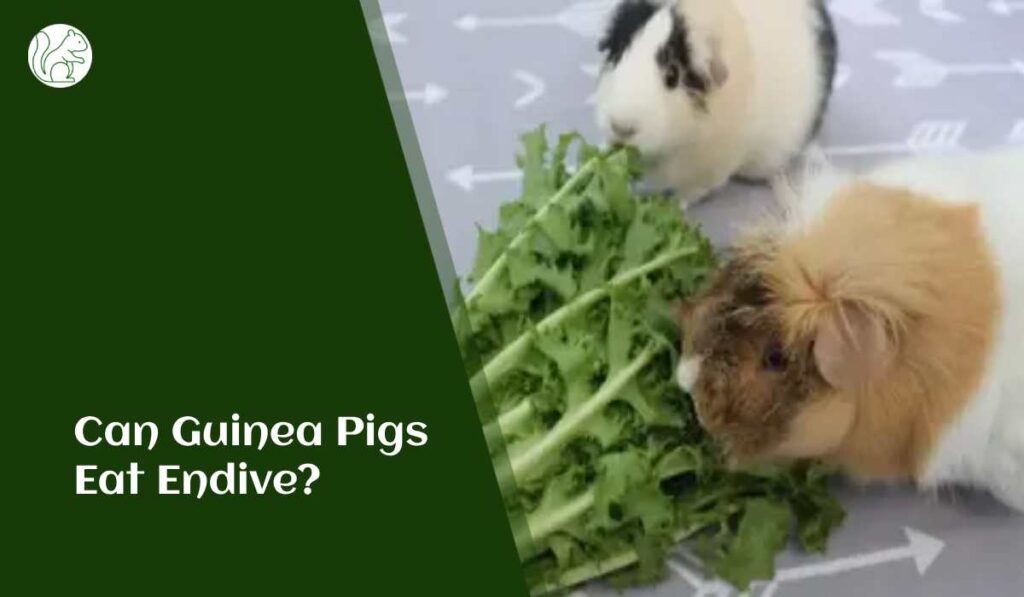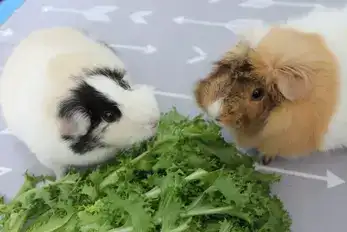If you are a proud guinea pig owner, you must understand the importance of providing a balanced and nutritious diet for your furry companion. Guinea pigs can eat endive in moderation. Guinea pigs thrive on a diet that consists primarily of hay, fresh vegetables, and a limited amount of fruits. When it comes to expanding their dietary options, you may be wondering if endive, a leafy green vegetable, is a safe and healthy choice for guinea pigs. In this article, we will explore whether guinea pigs can eat endive, its nutritional value, potential health benefits, and any precautions you should take.

What is Endive?
Endive, scientifically known as Cichorium endivia, is a leafy green vegetable that belongs to the daisy family. It is often confused with chicory, as both plants share similar characteristics. Endive leaves are typically elongated and curly, with a slightly bitter taste. This vegetable is available in two main varieties: curly endive and escarole endive.
Nutritional Value of Endive
Endive is low in calories and fat, making it a healthy addition to any diet. It is a rich source of essential vitamins and minerals, including vitamin K, vitamin A, vitamin C, folate, calcium, and potassium. The high fiber content in endive promotes healthy digestion and can help prevent constipation in guinea pigs.
Can Guinea Pigs Eat Endive?
Yes, guinea pigs can eat endive in moderation. It is safe for them to consume, but it should be offered as part of a varied diet alongside other vegetables. The slightly bitter taste of endive may not appeal to all guinea pigs, so it’s important to introduce it gradually and observe their response. As with any new food, start by offering a small amount and monitor for any adverse reactions.
Health Benefits of Endive for Guinea Pigs
Including endive in your guinea pig’s diet can offer several health benefits. Here are some key advantages:

a. Vitamin and Mineral Boost: Endive contains a range of vitamins and minerals that are beneficial for guinea pigs. Vitamin C is particularly crucial for these small animals since they cannot produce it naturally in their bodies. Regular intake of vitamin C helps support their immune system, prevents scurvy, and promotes overall well-being.
b. Hydration: Endive has a high water content, which helps keep your guinea pig hydrated. Sufficient hydration is vital for maintaining healthy bodily functions and preventing issues like urinary tract problems.
c. Digestive Health: The fiber in endive aids in digestion and prevents gastrointestinal issues. It can also assist in wearing down guinea pigs’ continuously growing teeth.
Precautions to Take
While endive is generally safe for guinea pigs, there are a few precautions to keep in mind:
a. Moderation: Like any other vegetable, endive should be fed to guinea pigs in moderation. Introduce it gradually into their diet and observe their response. Too much endive can cause digestive upset or diarrhea due to its high water and fiber content.
b. Pesticide-Free: Ensure that the endive you offer to your guinea pig is organic and free from pesticides. Pesticide residue can be harmful to their health.
c. Variety is Key: Remember that endive should not be the sole vegetable in your guinea pig’s diet. Offer a diverse range of fresh vegetables to provide a balanced nutritional intake.
Conclusion
In conclusion, guinea pigs can eat endive as part of a balanced diet. It is a nutritious vegetable that can provide essential vitamins, minerals, and hydration for your furry friend. However, moderation is key, and it should be introduced gradually alongside other vegetables. Remember to choose organic, pesticide-free endive and offer a variety of fresh vegetables to ensure a well-rounded diet for your guinea pig. By incorporating endive responsibly into their meals, you can contribute to the overall health and happiness of your beloved guinea pig companion.
